‘What is “really” there? I don’t know, but I rather doubt that it “is” a Platonic idea or an Aristotelian Essence or even a Kantian ding an sich.’ – RAW, letter; June 1987
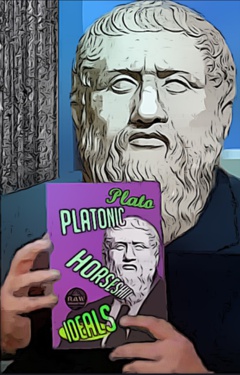
A critique of “Platonism” runs through RAW’s work – Bob W. appears to treat contemporary manifestations of Plato’s metaphysics as, variously, a persistent malaise, an anachronism, a bug in our brain software, an authoritarian crutch, lazy thinking, morally and politically reactionary, unscientific, etc.
Given pressing global problems here in the 2020s, why should we give a damn about Plato? Well, before we consider contemporary Red Pill Platonism, ponder this passage from a letter that RAW wrote to Kurt Smith:
‘I think I am highlighting the basic defects that underlie the gross errors that dominate politics and religion and conventional thought generally. That is, I think the world is run by rulers and populated by followers who are all Platonists and/or Aristotelians without even having studied those philosophies. By challenging the Platonic/Aristotelian systems, I am, I think, doing a kind of sociological psychotherapy or sewer cleaning.’
– RAW, letter, June 1987
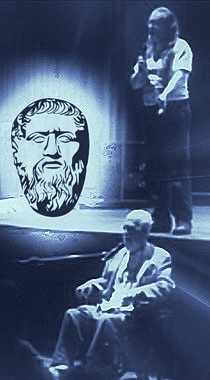
During the post-film Q&A session for the premiere of Maybe Logic, RAW was asked how his philosophy was influenced by Plato, and he responded with the line that Plato’s notion of ideal form (“eidos”) hidden behind the everyday world of sensation and appearance “implies that there’s gotta be an ideal chicken coop somewhere, which means there must be ideal chickens, which means there must be ideal chicken shit.”
He added: “When I got that far I decided there must be something wrong with Plato’s philosophy. I didn’t follow it any further.” (If that seems bluntly final, bear in mind that RAW’s next words were: “It’s late and I’m tired. Have pity on the aged. Do not mock Quasimodo” – to audience laughter).
I’ll return to Ideal Platonic Shit Forms below. First, though, a quiz of sorts…
Plato vs Aristotle

(Not the Alien vs. Predator kind of “versus”, although some philosophy historians have declared Alien, I mean Aristotle, a “winner” in the contest of enduring influence).
- What do Platonic and Aristotelian metaphysics have in common? (Aside from the obvious: ancient Greek bearded-bloke origins, etc). RAW often cites Plato and Aristotle together as a pair in his semantic-philosophical overviews, because of certain implications that their philosophies “share” (not in the Facebook sense).
- What seems the fundamental difference – indeed “opposition” – between Platonic metaphysics and Aristotelian metaphysics? (Reflected sometimes on those occasions where RAW cites them separately for specific purposes).
Here’s a quote from Quantum Psychology (chapter 6) that provides an answer of sorts to question 1.:
‘Plato, Aristotle and other geniuses attempted to escape the agnosticism or Zeteticism of the Skeptics by “finding,” or claiming to find, a method of Pure Abstract Reasoning that, they believed, would arrive at Pure Truth without any distortions introduced by our fallible human sense organs.’
– RAW, Quantum Psychology, chapter 6
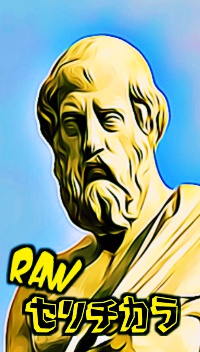
So, Plato and Aristotle both originated a type of metaphysics that implies an “objective”, “rational” knowledge of the world, which leaves no room for scepticism. Both based, incidentally, on earlier folk theories of “essences”, but in a fundamentally different way – with Plato taking an idealist viewpoint and Aristotle grounded in essentialist realism (which is the start of an answer to question 2). RAW continues:
‘Aside from a few conservatives in Chairs of Philosophy, the world now realizes that the Greek search for such Pure Truth failed; and the subsequent history of philosophy seems like a long detective story — the gradual discovery, century after century, of the numerous “lies” (unconscious prejudices) that crept into the Pure Reasoning of those bold Hellenic pioneers.’
– RAW, Quantum Psychology, chapter 6 (brackets in original)
That “long detective story” that RAW refers to achieves, for me, some much-needed clarity in relatively recent cognitive science, particularly in semantic/linguistic approaches to basic conceptual metaphor in early western (pre-Socratic/Platonic/Aristotelian) metaphysics. Hopefully I can convey a bit of that clarity below – because it’s one thing to state that Plato (the idealist) and Aristotle (the realist) “shared” a metaphysical implication of certain, scepticism-free, direct intelligibility of the world “as it is”, but another thing to understand what relevance, if any, that has to current social, political, personal or global problems.
“Is” of identity, “As” of metaphor
As RAW points out, some philosophy, like some modern physics, can seem clearer (in some ways) when restated in E-prime. It can also seem clearer when deconstructed in terms of conceptual metaphor. Metaphor has become my “go to” approach whenever I seek insight on opaque matters. Here’s the way I look at it:
X is Y (“is” of identity)
X as Y (“as” of metaphor)
For example, as applied to metaphysical propositions:
“The essence of being is water” – this comes from the pre-Socratic philosopher, Thales (born c. 623 BC). His hypothesis (which derived from earlier Earth/Air/Fire/Water ‘Elements’ folk theories) stated that the originating principle of nature is a single substance: water.
Restating in E-prime, one might say: “Thales conceived the essence of being as water”. In other words, he used a conceptual metaphor (understanding one thing – an abstract idea such as “essence” – in terms of another thing, ie water).
Other early metaphors for being include: essence of being as air (Anaximenes), as indeterminate matter (Anaximander); as change (Heraclitus); as number (Pythagoreans), as chaos (Eris, probably, but don’t quote me), etc.
As with E-prime, one moves away from the literal “is” of identity, but with emphasis on the metaphor used. The “choice” (not implying conscious choice) of metaphor in any thought, belief or communication – whether Plato’s dialogues or Trump’s tweets – has implications that come from the “source domain” of the metaphor (water, in the above case), and these implications may be unobvious or even “hidden”, and yet consequential in important ways.
For example, Plato’s metaphors for being – as idea/ideal – have non-trivial moral and even political implications, as we’ll see below.
Ideal Platonic Horseshit
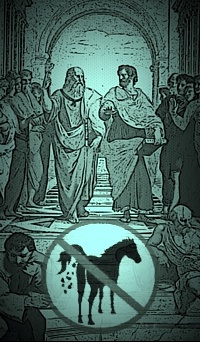
First, though, a relaxing interlude! – let’s look at Wilson’s guerilla-ontology approach to Plato’s ideal-idea-form notion, featuring genuine Ideal Chickenshit and real Platonic Horseshit!
I note that Bob uses the phrase “Ideal Platonic Horseshit” multiple times – I count 14 times (including variants) – in his book, Natural Law. For example:
‘[A]ccording to Plato, every chair we encounter in sensory-sensual experience “is” an imperfect copy of the Ideal Chair somewhere outside space-time. From this I long ago deduced that every horse encountered and endured in space-time is also an imperfect copy of the Ideal Platonic Horse and all the horseshit I have ever stepped in is just an imperfect copy of Ideal Platonic Horseshit.’ – RAW, Natural Law
Natural Law (the book) contains, as a main theme, RAW’s observation that many contemporary renditions of what passes for “Natural Law” look, to him, like reformulations of Platonism:
‘We will see as we continue that Natural Law in the theological-moral sense, not observable or measurable in space-time, exists in or refers to the same ghostly or extramundane plane where some people go in verbal trance or hypnosis and where there is Ideal Platonic Horseshit in abundant supply.’ – RAW, Natural Law
Eidos, ethics & politics – in metaphor
RAW’s “Platonic Horseshit” notion refers, of course, to Plato’s original, signature contribution to metaphysics. In metaphorical terms, Plato saw the essence of being as both idea and ideal. In other words, he conceived the “true essences” of things in the world as ideal forms directly knowable by the mind. That’s what makes scepticism-free “objective” knowledge of the world “as it is” possible in his metaphysics – we know what’s truly, essentially real directly, as ideal-idea-essence.
The implications – or “entailments” – that follow from this metaphorical conception of being can be summarised as follows (I’m referring here to Philsophy in the Flesh, by Lakoff and Johnson):
- ‘If essences are ideas, they cannot be material in nature and therefore must be forms. Hence the celebrated notion of the Platonic form.’
- ‘The ideas, which are directly present in the mind, have more reality than the objects themselves, which are not.’
- In a hierarchy of “Degrees of Being”, ideas are most real – ‘having the most Being – with physical objects next, and images, shadows, and reflections of objects having the least degree of Being.’ (cf: Plato’s Allegory of the Cave).
- With the Essences as Ideals metaphor, it follows that ‘the essence of something is the best example of that thing, the standard against which all (lesser) real things are measured. Hence, the idea of chair not only characterizes the essence of a chair, but also sets the standard for what a chair should be.’
- Perceptible objects in the world “are” inferior “copies” of the ideal-idea-form essences.
When applied to humans, the latter two points link Plato’s metaphysics to a theory of ethics. With essences equated with ideals, it follows that only positive qualities can be regarded as essences. Thus, one sees no Platonic ideals of negative qualities – dishonesty, cowardice, etc. These are seen as deficits – absences of human essences such as honesty and courage. This leads to the rather sinister implication that fibbers, thieves and cowards (etc) “are” less than ideally or fully human – ie sub-human.
Karl Popper’s Plato
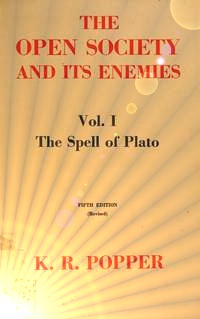
Having established the link between Plato’s metaphysics and the belief that people who don’t live up to one’s moral ideals “really are” sub-human, it seems worth mentioning the political dimensions to Plato’s ideas, as notably indicted in volume 1 of Karl Popper’s ‘The Open Society and Its Enemies’.
RAW recommended both volumes of Popper’s Open Society as essential reading. Volume One deals with Plato, and it struck me (when I read it, many years ago) as incredibly lucid and scathing on Plato’s output – I imagined it may have been a really big influence on RAW’s thinking. Popper doesn’t hold back in laying out just how entirely totalitarian – in a proto-ultra-“rightwing” way (modern-day sense) – Plato’s notions seem to him.
(I was apparently so impressed with Popper’s book on Plato, which I borrowed from my local library, pre-internet days, that I hand-wrote pages and pages of notes, which I still have. I’ll leave that to another blog post…).
Idealism & Realism (… & Essentialism)
Metaphor, as RAW has pointed out, becomes a necessity when we attempt to conceptualise “truths” at “higher” (more abstract, more inclusive) levels. Plato, the idealist, sees the real essences of things as idea-forms – the world takes shape from ideas. Aristotle, the realist, sees essences “in” the world – ideas take shape from the world.
In other words, the metaphorical relationship (comprehending one kind of thing in terms of another) between “essence” and “idea” goes in opposite directions for Plato and Aristotle. Plato uses the conceptual metaphor of “Essences as Ideas”, whereas Aristotle uses the metaphor of “Ideas are Essences” (ie ideas, including logic, reflecting the essences of things as they really “are” in the world).
Both Plato and Aristotle can be considered “essentialists” – both apparently subscribed to much older folk theories of essences. Importantly for RAW’s combined citations of Plato and Aristotle (to repeat myself for emphasis), they both provided a metaphysics that entails a “certain”, “true”, “objective”, “direct” apprehension of the world “as it is”, with no disconnection between the mind and world. The difference consists of whether the world takes its shape from ideas (as with Plato) or whether ideas take their shape from the world (as with Aristotle).
‘[Percy] Bridgman explicitly pointed out that “common sense” derives unknowingly from some tenets of ancient philosophy and speculation — particularly Platonic Idealism and Aristotelian “essentialism” — and that this philosophy assumes many axioms that now appear either untrue or unprovable.’
– RAW, Quantum Psychology, Fore-words
Red Pill Platonism
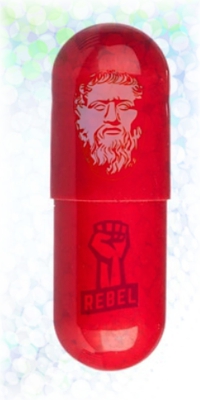
It wouldn’t surprise me to hear some “radicals” argue that Plato, like Covid, “is” just another fake construct to control us all, and that evidence to the contrary “is” just mere propagandistic appearance clouding “the real truth”.
Seeing “the real truth” behind the everyday appearances requires, in this “radical” view, some variety of “taking the Red Pill”. And what seems to be the secret ingredients of the Red Pill?: Platonism + potato(-head) starch + dried-horseshit filler!
I do sometimes think that when seemingly intelligent people simply dismiss evidence and facts that seem well-supported (by most conventional standards) – not just in a subtle “confirmation bias” way of excluding a few inconvenient items, but in a more sweeping, wholescale manner (often accompanied by some online equivalent of sneering, etc), with intimations of an underlying Real Truth™ behind the mere factual appearances – that they exhibit a kind of 21st century Platonism, complete with an abundance of Ideal Platonic Horseshit.
After-blog words
You have been reading a summary of the aspects of Platonism that, for me, seem most relevant to RAW’s writings. Aristotle requires a separate summary because of RAW’s regular General Semantics type treatment of Aristotelian logic, etc. “Suffice it to say” here that in Aristotle’s metaphysics, classic symbolic logic “wasn’t” just an abstract truth of reasoning, but a truth in, and of, the world – ie an ontological principle, part of the structure/essence of the world “as it is”.
The usual caveat applies with modern commentary on ancient ideas – the problem of anachronistic interpretations of those Greek guys. Many basic concepts we take for granted weren’t around 2,400 years ago, so we presume, project and imagine a lot.
On the word, ‘Eidos’
‘The word form has been used in a number of ways throughout the history of philosophy and aesthetics. It was early applied to Plato’s term eidos, by which he identified the permanent reality that makes a thing what it is, in contrast to the particulars that are finite and subject to change.’ – Encyclopedia Britannica on form
‘An essence for Plato is an Eidos, a form, that is, the “look” of a thing that makes it what it is. Aristotle, by contrast, locates reality ultimately in the world, and he thus sees our thought as dependent upon the nature of the world.’ – Lakoff & Johnson, Philsophy in the Flesh

I like the ‘Red Pill Platonism’ designation. Not heard that before.
LikeLike
I may’ve coined the label, as I’ve searched and can’t find anyone else using it. I wanted an idea that conveyed the contemporary relevance of RAW’s critical takes on Platonism, and it popped into my head as a fairly good fit for a strain of thought one sees in some of the QAnon type stuff.
LikeLike
Plato’s “degrees of being” with transcendental realities gradually taking material forms sounds very much like occult systems that are still current. Nice post, by the way.
LikeLiked by 1 person
I loved this post, and your coinage of “Red Pill Platonism” seems brilliant to me.
Good use of Lakoff/Johnson w/in the context of RAW’s thinking about metaphysics. (Here: what it ain’t.) Philosophy In The Flesh would probably be the first text I’d look at outside of RAW when trying to get a grip on his own postmodern-ish play with “metaphysics.”
A number of pro-Aristotelians I’ve corresponded with think RAW (via Korzybski) has dwelled perhaps too much on Aristotle’s Logic, while there seems to be more “grey” areas in his Rhetoric and oddly, Metaphysics. I haven’t yet chewed, swallowed and digested those two other books by “Arry” (what Pound called him).
I did get a visceral thrill when I read Popper’s long and righteous takedown of Plato and look forward to some future writing by you on doing marginalia. All of your writing seems brilliant to me. So: thanks for this!
LikeLike
Thanks for your generous words, Michael. Good observation on the “grey” areas in Aristotle. Funnily enough I deleted a brief section (from the first draft of my post) which touched on that – or rather I commented that RAW sort of “reduced” both Plato and Aristotle to specific roles in his own work, and he focuses laser-like on those (basically just 3, that I count) main roles for them. I decided that it seemed totally to RAW’s credit, given that his readers take away a real understanding of those important aspects in the same laser-like way that he covers them (even if those readers haven’t even looked at Plato or Aristotle before).
I agree on ‘Philosophy in the Flesh’, which I’m trying to include gently in my posts without forcing it on people, as I’ve found many (including some RAW fans) seem to react unfavorably to Lakoff (which I find tragic, given the level of his relevant-to-the-areas-RAW-covered contributions).
LikeLike